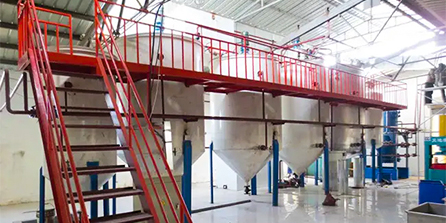Dis . 03, 2024 19:10 Back to list
Suppliers of Expeller Pressed Rapeseed Oil for Quality and Sustainability
Sourcing Quality Rapeseed Oil Expellers A Comprehensive Guide for Suppliers
In recent years, the demand for rapeseed oil has surged, positioning it as one of the most sought-after vegetable oils worldwide. This rise in popularity can be attributed to several factors, including its favorable nutritional profile, heart-healthy fats, and versatility in culinary applications. As a result, the market for rapeseed oil expellers has also expanded, presenting numerous opportunities for suppliers. This article aims to provide insights into sourcing quality rapeseed oil expellers and understanding the supply chain dynamics involved.
Understanding Rapeseed Oil Expellers
Rapeseed oil expellers are machines used to extract oil from rapeseeds, the seeds of the Brassica napus plant. These machines press seeds to extract oil efficiently, ensuring minimal loss and maximizing the volume of oil obtained. There are various types of expellers available, including screw presses, hydraulic presses, and cold-press machines. Each type has its advantages, depending on the scale of production and quality requirements.
Key Considerations for Suppliers
1. Quality of Machinery The first step to ensuring the success of rapeseed oil extraction is selecting high-quality expellers. Suppliers should look for machines manufactured with durable materials, offering longevity and reliability. Certifications such as ISO and CE can help potential buyers ensure the machinery meets international standards.
2. Production Capacity Different suppliers will have varying production capacities. It’s crucial for operators to select machinery that aligns with their operational scale. Smaller operations may opt for compact expellers suitable for lower throughput, while larger producers might require bigger machines that can handle higher volumes of seed.
3. Energy Efficiency Energy consumption is a significant factor in the overall operational costs of an expeller. Suppliers should consider machines that have energy-efficient designs to minimize operational costs. Modern expellers often come equipped with features that optimize energy usage, helping operators reduce their carbon footprint.
4. Ease of Maintenance Maintenance requirements can significantly impact the operational efficiency of rapeseed oil expellers. When sourcing machinery, suppliers should prioritize designs that are easy to clean and maintain. Ideally, machines should have accessible parts and straightforward servicing procedures to reduce downtime.
5. Technology and Automation The advent of technology has transformed the oil extraction process, leading to more sophisticated expellers that offer automation features. Suppliers should assess whether fully automated or semi-automated options suit their needs. Automation can streamline the extraction process, improve consistency, and enhance overall productivity.
6. Supplier Reputation Research the track record of expeller manufacturers. Supplier reputation can often be indicative of the machinery’s performance and the level of after-sales support offered. Look for reviews, testimonials, and case studies that provide insights into the reliability of the machinery and the responsiveness of the supplier.
rapeseed oil expeller suppliers

7. Cost and Financial Considerations While it might be tempting to choose the lowest-priced option, it’s essential to evaluate the total cost of ownership, which includes maintenance, operation, and lifespan of the machine. An upfront investment in a higher-quality expeller may yield better returns in the long run.
Sourcing Process
The process of sourcing rapeseed oil expellers involves several steps
- Research Conduct thorough research online and offline to identify potential suppliers. Attend trade shows, industry exhibitions, and seminars to connect with manufacturers and industry experts.
- Request Quotations Contact multiple suppliers to request detailed quotations, including specifications, pricing, and delivery timelines.
- Assess Samples If possible, assess samples of the machinery or visit facilities where the expellers are being used to observe their performance in real-time.
- Negotiate Terms Engage in negotiations regarding pricing, warranty, and service agreements. Establish clear communication regarding expectations and delivery timelines.
- Post-Purchase Support After purchasing, ensure that you have access to technical support and replacement parts. Establishing a robust relationship with the supplier can help in resolving any issues that may arise in the future.
Conclusion
Sourcing rapeseed oil expellers requires careful consideration of various factors, from quality and efficiency to supplier reputation and post-purchase support. By taking the time to evaluate options thoroughly and aligning machinery choices with operational goals, suppliers can capitalize on the growing demand for rapeseed oil and contribute to the sustainability and success of their operations. As the market for rapeseed oil continues to expand, selecting the right expeller will be crucial for any venture aiming to thrive in this competitive industry.
-
HP290 First Press Oil Expeller Machinery: Efficient Oil Extraction
NewsAug.02,2025
-
Top Food Oil Refined Unit Companies w/ GPT-4 Turbo Tech
NewsAug.01,2025
-
Premium Black Seed Oil Expeller - High Efficiency Cold Press Oil Machine
NewsJul.31,2025
-
Oil Processing Equipment - High-Efficiency Flaking Machine
NewsJul.25,2025
-
High-Efficiency Peanut Oil Refined Machine for Quality Oil Production Leading Exporters & Companies
NewsJul.08,2025
-
High Efficiency Sunflower Seed Oil Press – Leading Cooking Oil Press Machine Factories & Suppliers
NewsJul.08,2025
